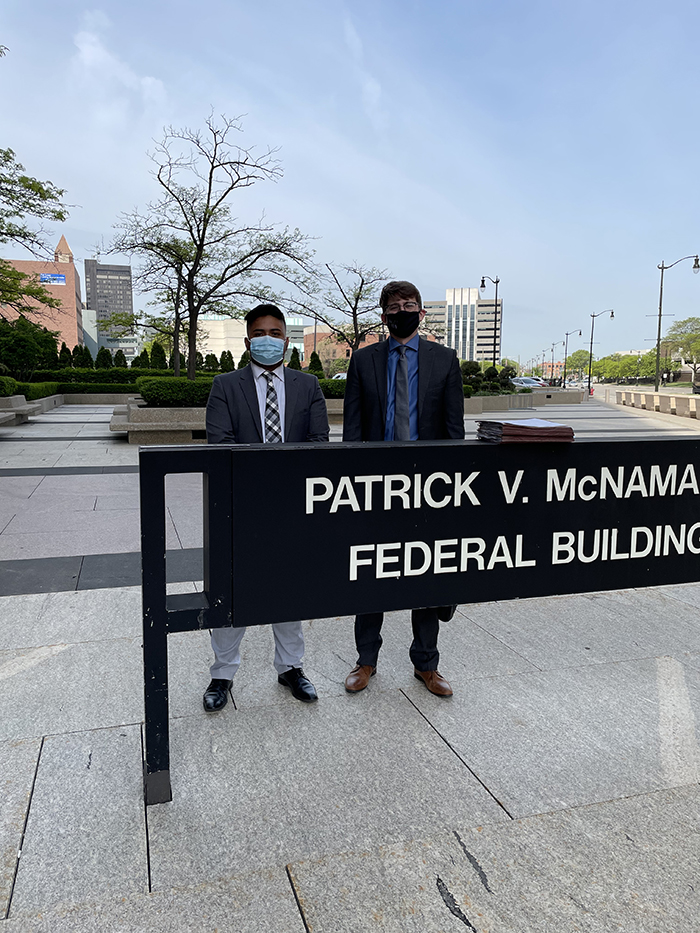Immigration Law Clinic Secures Status for Longtime Client

A longtime client of the Immigration Law Clinic earned a life-changing result on May 17 in Detroit. Over four years, MSU Law student clinicians from four graduating classes worked to achieve this outcome, and Matthew Desafey, ’22, managed the final step as he successfully represented the client at his pivotal immigration court hearing, securing the client’s lawful permanent residence.
The client left El Salvador as a minor, escaping an abusive home in an area with high levels of gang activity and recruitment. He was at risk of being removed from the United States despite his Special Immigrant Juvenile Status, which was previously obtained for him by the Immigration Law Clinic in 2018.
“Special Immigrant Juvenile Status offers a path to lawful permanent residence (a green card) for certain immigrant children,” Immigration Law Clinic Director and Professor Veronica Thronson explained. “It provides an avenue for undocumented children to obtain lawful status when they are subject to juvenile court jurisdiction and meet certain criteria. In this case, the Probate Court in the context of a guardianship proceeding filed by the Clinic found that the client could not be reunified with one or both parents due to abuse, neglect, abandonment, or a similar basis under state law, and that it was not in his best interest to return to their home country.”
A backlog of visas for children applying for permanent residence as Special Immigrant Juveniles for petitioners from El Salvador and other Central American countries complicated the client’s removal proceedings. In late December 2020, a visa finally became available for the client and Desafey, who joined the case in January 2021, filed motions that successfully advanced the client’s immigration court hearing to determine his admissibility for a green card.
Desafey, a first-time student clinician, recounted the confidence that he and Professor Thronson felt in their client’s case – but he also acknowledged learning to navigate the high stakes.
“Any legal proceeding has weight – it’s going to affect someone’s life – whether it’s a business deal or this, but I felt like if we got this wrong or if we presented something the judge didn’t like, because the judge has discretion […], our client’s life could have been really negatively affected,” he said.
Student clinicians who worked on this client’s case include Courtney Hammer, ’18, Kathryn Bristor, ’18, Virginia Pavlick, ’19, Logan Byrne, ’20, Victoria Espinoza, ’20, Carly Cruickshank, ’22, and Jessica Hollan, ’22, along with former Immigration Clinic Teaching Fellow Beth Zilberman (now a professor at the University of Arkansas School of Law).
“I really want to give kudos to the other clinicians who worked on this, and everyone who has been involved on this,” Desafey said. “A lot of people worked really hard on this case, especially Professor Thronson. It’s been a group effort.”
Desafey met his client for the first time in person at the hearing in May due to COVID-19 restrictions, and this hearing was also his first time arguing in front of a judge. He said the experience was rewarding in many ways, but especially seeing a great client awarded with the outcome he deserved. The experience allowed him to apply the skills he’s learned in the classroom and the Clinic – and he encourages other law students to take advantage of the opportunity to proactively use the knowledge they are gaining to make a difference.
“MSU has given us the background and the strong training from the professors, and other areas that we’ve been able to supplement our legal education, that we can be confident in our abilities, and putting in the hard work in these clinics really can be life-changing,” he explained, adding, “Do a clinic – because in law school it’s the vehicle that will allow you to have the most tangible effect on someone’s life in a good way.”

